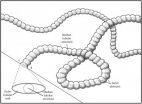(Press-News.org) A new study by researchers at the Intermountain Medical Center Heart Institute in Salt Lake City has found that atrial fibrillation patients who are on blood thinning medications are at higher risk of developing dementia if their doses are not in the optimal recommended range.
The study of more than 2,600 AFib patients found they are significantly more likely to develop dementia when using medicines to prevent blood clots, such as warfarin, when their dosing is too high or too low for an extended period of time.
Findings from the study will be presented at the 2014 Annual Heart Rhythm Society Scientific Session on Friday, May 9, 2014, at 6:30 pm, EDT, in San Francisco.
In the United States, nearly one in 10 people, or about 2.7 million Americans, develop AFib in their lifetimes. Atrial fibrillation is a quivering or irregular heartbeat that can lead to blood clots, stroke, heart failure and other heart-related complications.
Physicians try to achieve an international normalized ratio (a test used to learn how fast the blood clots) of two to three, which is within the therapeutic range, or the safety range. Typically, dosages higher than the therapeutic range can increase the risk of bleeding. If the dose is lower than the therapeutic range, it can increase risk of blood clots forming.
Three years ago researchers at the Intermountain Medical Center Heart Institute found that patients with atrial fibrillation were at higher risk for developing dementia, but the cause of that association — the link between anticoagulation medication and dementia — was unknown.
"Most patients who develop atrial fibrillation require the use of an anticoagulant to prevent a stroke. The most common anticoagulant used worldwide is warfarin, and we now know that if warfarin doses are consistently too high or too low, one of the long-term consequences can be brain damage," said Jared Bunch, MD, lead author and director of electrophysiology research at the Intermountain Medical Center Heart Institute. "This points to the possibility that dementia in atrial fibrillation patients is partly due to small repetitive clots and/or bleeds in the brain."
Results from the Intermountain Medical Center Heart Institute study were collected from 2,693 patients, with 4.1 percent of them being diagnosed with dementia. Results were based on the percentage of time their blood-thinning medications were within the range. The more time their dosages were within the range, the less risk they had of developing dementia.
Specifically:
Patients within the therapeutic range less than 25 percent of the time were 4.5 times more likely to develop dementia.
Patients within the therapeutic range 25-50 percent of the time were 4.1 times more likely to develop dementia.
Patients within the therapeutic range 51-75 percent were only 2.5 percent more likely to develop dementia.
The increased risk remained significant when adjusting for common risks of both stroke and bleeding, noted Dr. Bunch.
"Our results from the study tell us two things," he said. "With careful use of anticoagulation medications, the dementia risk can be reduced. Patients on warfarin need very close follow-up in specialized anticoagulation centers if possible to ensure their blood levels are within the recommended levels more often.
"Second, these results also point to a potential new long-term consequence of dependency on long-term anticoagulation medications. In this regard, stroke prevention therapies do not require long-term anticoagulation medications and reducing the use of these drugs will hopefully lower dementia risk."
Dementia is cognitive dysfunction that impacts quality of life. Dementia is a progressive disease, and the impact on quality of life often worsens not only for patients, but also for their families and loved ones.
Warfarin is used to prevent blood clots in atrial fibrillation patients, and though it is an effective therapy, the drug poses risks if improperly dosed. Proper dosing of warfarin is complicated because the drug interacts with many other common medications, as well as some foods.
When determining an initial dose of warfarin, physicians often start with a standard dose and can take certain clinical indicators into account to alter that dose. These clinical measures include age, body size, smoking status, and use of certain medications. During the initial weeks of therapy, the warfarin activity is monitored closely through blood tests, and adjustments are made as needed.
INFORMATION: END
Study finds patients AFib at higher risk of dementia when meds out of range
Study included 2,600 AFib patients
2014-05-10
ELSE PRESS RELEASES FROM THIS DATE:
Bee biodiversity boosts crop yields
2014-05-10
Research from North Carolina State University shows that blueberries produce more seeds and larger berries if they are visited by more diverse bee species, allowing farmers to harvest significantly more pounds of fruit per acre.
"We wanted to understand the functional role of diversity," says Dr. Hannah Burrack, an associate professor of entomology at NC State and co-author of a paper on the research. "And we found that there is a quantifiable benefit of having a lot of different types of bees pollinating a crop."
The researchers looked at blueberries in North Carolina ...
Scientists find gene behind a highly prevalent facial anomaly
2014-05-10
CAMBRIDGE, Mass. (May 9, 2014) – Whitehead Institute scientists have identified a genetic cause of a facial disorder known as hemifacial microsomia (HFM). The researchers find that duplication of the gene OTX2 induces HFM, the second-most common facial anomaly after cleft lip and palate.
HFM affects approximately one in 3,500 births. While some cases appear to run in families, no gene had been found to be causative. That is until Whitehead Fellow Yaniv Erlich and his lab set out to do just that. Their work is described in this week's issue of the journal PLOS ONE.
Patients ...
Cardiac screening test may help determine who should take aspirin to prevent heart attack
2014-05-09
MINNEAPOLIS, MN – May 6, 2014 – For over 30 years, aspirin has been known to prevent heart attacks and strokes, but who exactly should take a daily aspirin remains unclear. New research published today in Circulation: Cardiovascular Quality and Outcomes shows that your coronary artery calcium (CAC) score, a measurement of plaque in the arteries that feed the heart, may help determine whether or not you are a good candidate for aspirin.
"Many heart attacks and strokes occur in individuals who do not appear to be at high risk," states lead author, Michael D Miedema, MD, ...
NASA's TRMM Satellite see spring storms hit the US Great Plains
2014-05-09
VIDEO:
The TRMM satellite flew above tornado spawning thunderstorms in the southern United States on May 9, 2014 at 0115 UTC. This simulated 3-D TRMM animation shows the location of intense...
Click here for more information.
The Tropical Rainfall Measuring Mission or TRMM satellite captured rainfall and cloud height information about the powerful thunderstorms and severe weather that affected the Great Plains over May 8 and 9.
Severe weather extended from Minnesota to southern ...
Plugging leaky blood vessels to save vision
2014-05-09
TORONTO – A new drug approach has been developed for safer clean-up of deformed blood vessels in the eye by a research team at the Lunenfeld-Tanenbaum Research Institute, Mount Sinai Hospital in Toronto.
The growth of malformed blood vessels that can burst is a leading cause of vision loss in North America. Retinopathy and retina degeneration are associated with premature birth, with diabetes, and with increasing age.
Research just published by Dr. Andras Nagy and co-authors shows both safety and effectiveness in their bioengineered compound when treating retinopathy ...
Paleontologists discover new fossil organism
2014-05-09
RIVERSIDE, Calif. — Scientists at the University of California, Riverside have discovered a fossil of a newly discovered organism from the "Ediacara Biota" — a group of organisms that occurred in the Ediacaran period of geologic time.
Named Plexus ricei and resembling a curving tube, the organism resided on the Ediacaran seafloor. Plexus ricei individuals ranged in size from 5 to 80 centimeters long and 5 to 20 millimeters wide. Along with the rest of the Ediacara Biota, it evolved around 575 million years ago and disappeared from the fossil record around 540 million ...
Discovery links rare, childhood neurodegenerative diseases to common problem in DNA repair
2014-05-09
(MEMPHIS, Tenn. – May 9, 2014) St. Jude Children's Research Hospital scientists studying two rare, inherited childhood neurodegenerative disorders have identified a new, possibly common source of DNA damage that may play a role in other neurodegenerative diseases, cancer and aging. The findings appear in the current issue of the scientific journal Nature Neuroscience.
Researchers showed for the first time that an enzyme required for normal DNA functioning causes DNA damage in the developing brain. DNA is the molecule found in nearly every cell that carries the instructions ...
Longevity gene may boost brain power
2014-05-09
Scientists showed that people who have a variant of a longevity gene, called KLOTHO, have improved brain skills such as thinking, learning and memory regardless of their age, sex, or whether they have a genetic risk factor for Alzheimer's disease. Increasing KLOTHO gene levels in mice made them smarter, possibly by increasing the strength of connections between nerve cells in the brain. The study was partly funded by the National Institutes of Health.
"This could be a major step toward helping millions around the world who are suffering from Alzheimer's disease and ...
Autism-related protein shown to play vital role in addiction
2014-05-09
BELMONT - In a paper published in the latest issue of the neuroscience journal Neuron, McLean Hospital investigators report that a gene essential for normal brain development, and previously linked to Autism Spectrum Disorders, also plays a critical role in addiction-related behaviors.
"In our lab, we investigate the brain mechanisms behind drug addiction – a common and devastating disease with limited treatment options," explained Christopher Cowan, PhD, director of the Integrated Neurobiology Laboratory at McLean and an associate professor of Psychiatry at Harvard Medical ...
Quick test can help spot depressed teenagers, UT Arlington nursing researcher finds
2014-05-09
A few minutes spent filling out a widely accepted mental health assessment in a health care provider's waiting room could make a big difference for some teenagers suffering from depression, according to new study from a nursing researcher at The University of Texas at Arlington.
Sharolyn Dihigo, a nurse practitioner and clinical assistant professor in the UT Arlington College of Nursing, recently examined available research to determine whether nurse practitioners and others in primary care settings should add a mental health screening to well visits for teenage patients. ...
LAST 30 PRESS RELEASES:
Bureaucracy Index 2026: Business sector hit hardest
ECMWF’s portable global forecasting model OpenIFS now available for all
Yale study challenges notion that aging means decline, finds many older adults improve over time
Korean researchers enable early detection of brain disorders with a single drop of saliva!
Swipe right, but safer
Duke-NUS scientists identify more effective way to detect poultry viruses in live markets
Low-intensity treadmill exercise preconditioning mitigates post-stroke injury in mouse models
How moss helped solve a grave-robbing mystery
How much sleep do teens get? Six-seven hours.
Patients regain weight rapidly after stopping weight loss drugs – but still keep off a quarter of weight lost
GLP-1 diabetes drugs linked to reduced risk of addiction and substance-related death
Councils face industry legal threats for campaigns warning against wood burning stoves
GLP-1 medications get at the heart of addiction: study
Global trauma study highlights shared learning as interest in whole blood resurges
Almost a third of Gen Z men agree a wife should obey her husband
Trapping light on thermal photodetectors shatters speed records
New review highlights the future of tubular solid oxide fuel cells for clean energy systems
Pig farm ammonia pollution may indirectly accelerate climate warming, new study finds
Modified biochar helps compost retain nitrogen and build richer soil organic matter
First gene regulation clinical trials for epilepsy show promising results
Life-changing drug identified for children with rare epilepsy
Husker researchers collaborate to explore fear of spiders
Mayo Clinic researchers discover hidden brain map that may improve epilepsy care
NYCST announces Round 2 Awards for space technology projects
How the Dobbs decision and abortion restrictions changed where medical students apply to residency programs
Microwave frying can help lower oil content for healthier French fries
In MS, wearable sensors may help identify people at risk of worsening disability
Study: Football associated with nearly one in five brain injuries in youth sports
Machine-learning immune-system analysis study may hold clues to personalized medicine
A promising potential therapeutic strategy for Rett syndrome
[Press-News.org] Study finds patients AFib at higher risk of dementia when meds out of rangeStudy included 2,600 AFib patients



